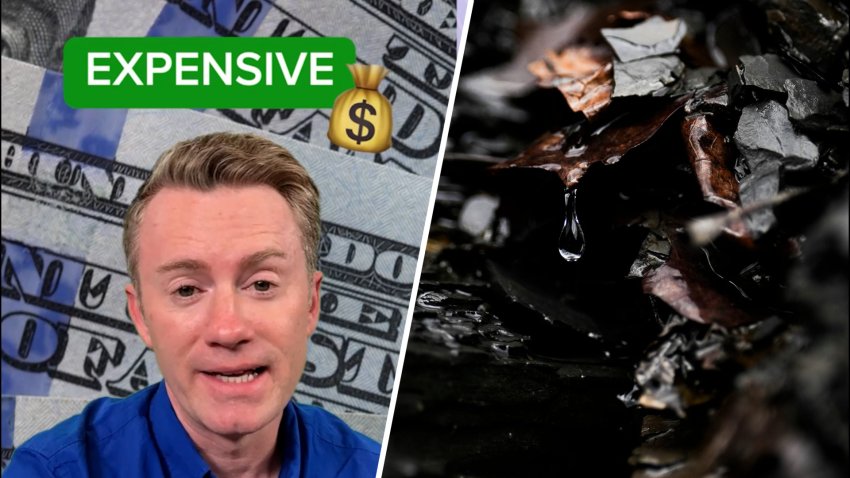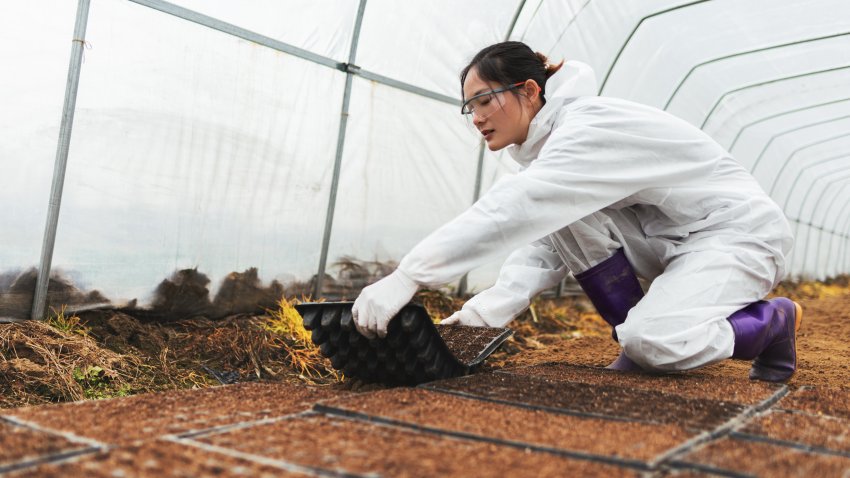-

Green isn't always good — especially in Antarctica
The coldest parts of our planet act like giant mirrors, reflecting the sun’s energy back to space. What happens when algae and pollution cover snow and ice? National climate reporter Chase Cain explains the ripple effects from Antarctica.
-

Climate-resilient corn, wheat, & soybeans could be ‘cash crops' for farmers
At the Salk Institute in San Diego, scientists are using AI to identify roots which will make crops more resilient to drought, floods, and extreme heat. If successful, it could also mean extra revenue for farmers. National climate reporter Chase Cain got an exclusive look inside the high-tech lab.
-

Climate change isn't funny — except in the hands of these comedians
Comedians have long used jokes to raise awareness of serious problems, and many are now turning the gaze to climate change.
-

What does Trump EO on coal mean for energy prices, environment?
NBC National Climate Reporter Chase Cain explains why bringing back coal may raise costs of energy and have a negative effect on our climate.
-

Scientists need more public funding to shield farming from climate change
Public funding for agricultural research was already declining. Now Trump has frozen or paused support for a variety of research programs.
-

US states race to attract smaller, cheaper nuclear reactors for AI development
U.S. states are positioning themselves to compete for newer, cheaper nuclear reactors being developed as communities and tech giants compete in a race for electricity.
-

Scientists warn of severe honey bee losses in 2025
Researchers at Washington State University projected that honey bee colonies in the U.S. could decline by up to 70% this year. Honey bee colonies in the U.S. are projected to decline by up to 70% in 2025, entomologists at Washington State University said on Tuesday. The university said in a press release that in the past decade, honey bee colony losses have...
-

Up-close look at rapidly melting glaciers from Alaska to Antarctica
Climate scientists and policymakers are gathering at the United Nations headquarters in New York for the inaugural World Day for Glaciers. The gathering aims to build global cooperation to slow climate change. National climate reporter Chase Cain takes us to some of our planet’s fastest melting glaciers.
-

Last decade was Earth's hottest ever as CO2 levels reach an 800,000-year high, UN report says
Last year was the hottest year on record, the top 10 hottest years were all in the past decade, a report Wednesday said.
-

India has six of the world's 10 most polluted cities, report shows
Chad in central Africa is the world’s most polluted country, while California has the worst air pollution in North America, according to an IQAir report.
-

Less friendly skies: How is climate change causing more turbulence on flights?
There has been a 55% increase in cases of moderate, severe or extreme turbulence, compared to 45 years ago.
-

California fire victims are in limbo as they wait for insurance payouts
The Eaton and Palisades fires displaced about 150,000 residents, and many remain in rentals and hotel rooms nearly two months later.
-

New stove that plugs into a normal wall outlet could be major gain for health and the climate
For 47 million American households, cooking means a gas stove. Gas stoves generate gases that aren’t good for people’s health and the gas itself contributes to climate change. But switching to electric cooking usually requires a licensed electrician to pull in 240-volt wiring, which can make switching from gas to electric expensive. Now a new stove built by a startup...
-

A global coffee price spike is about to drip into your mug
Climate impacts can increase the prevalence of diseases in coffee crops, reducing overall yields for farmers. Studies have shown that the arabica bean is particularly vulnerable to climate change.
-

Climate change is turning Valentine's Day bitter for chocolate lovers
The price of raw cocoa, chocolate’s key ingredient, has surged by 200% over the past year, a hike fueled by climate change.
-

Trump's executive orders might threaten growth of electric vehicles and wind power
With two executive orders, President Donald Trump changed the trajectory of two of the fastest-growing climate-friendly technologies in the U.S.: electric vehicles and wind power.
-

Last month set record for world's hottest January, EU scientists say
Copernicus says the world warmed to yet another monthly heat record in January, despite an abnormally chilly U.S. and predictions of a slightly less hot year.
-

Saving salmon can be a win-win for climate change
A team of Canadian scientists at CarbonRun discovered two environmental wins with one stone — limestone. Accelerating a natural process through “enhanced rock weathering” helps restore river ecosystems while also offsetting pollution from oil and gas. Climate reporter Chase Cain traveled to Nova Scotia to see how the first-of-its-kind process works.
-

Why did the ‘Doomsday Clock' just move closer to midnight?
The advocacy group Bulletin of the Atomic Scientists makes an annual announcement that rates how close humanity is to collapse.
-

US economic losses from natural disasters soared in 2024, even as they eased globally
Economic losses from hurricanes and other natural disasters soared in the U.S. last year and were above average globally, reflecting another year of costly severe storms, floods and droughts. Damage caused by Hurricanes Helene and Milton helped push total economic losses from natural disasters in the U.S. to $217.8 billion last year, an 85.3% increase from 2023, according to insurance...

